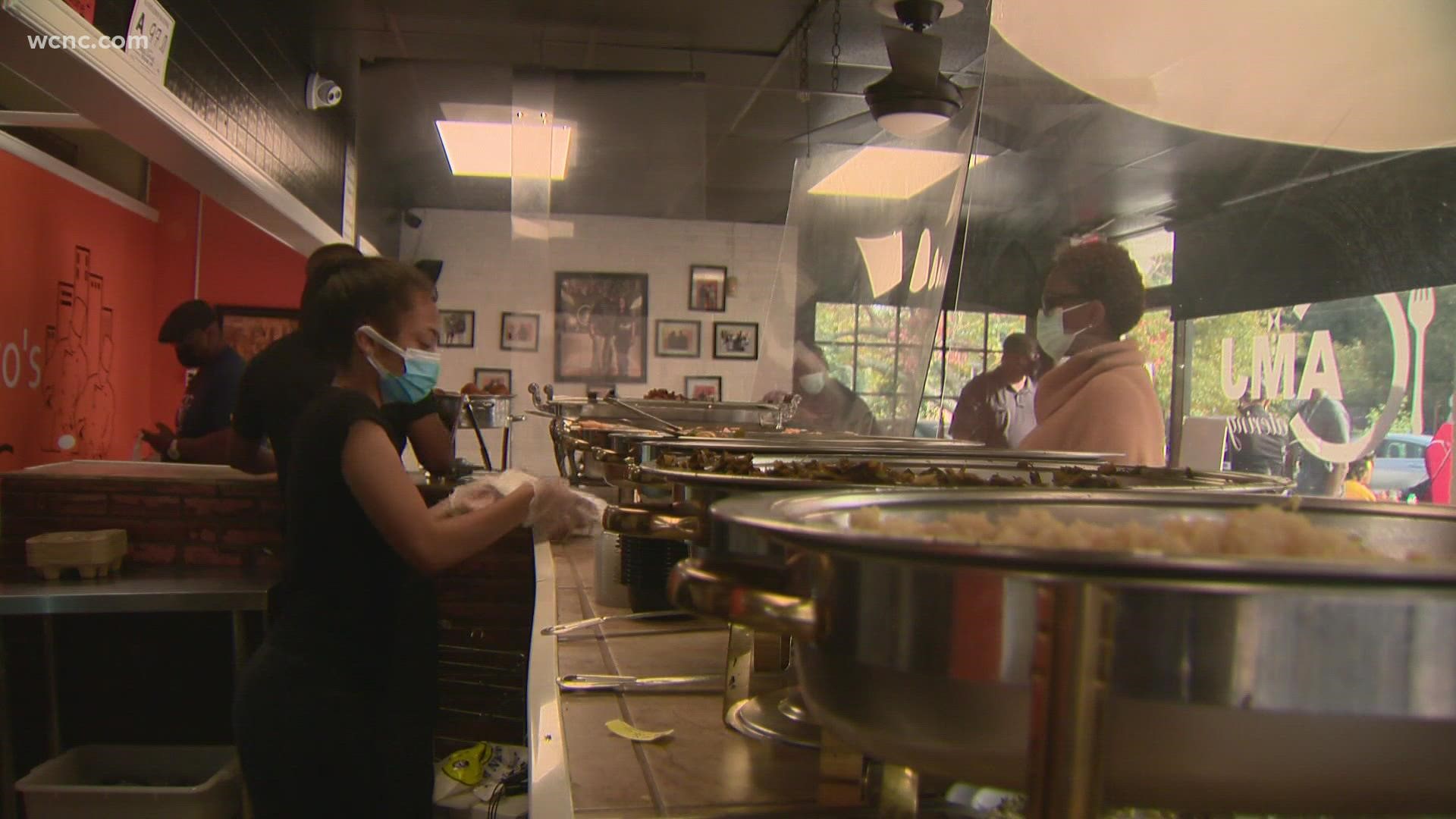CHARLOTTE, N.C. — At Dressler's in Midtown Charlotte, staff prepares for dinner, but every peel and pour is more expensive than before.
Jon Dressler said he sees that impact in his kitchen at Dressler's and at other restaurants in his Rare Roots Hospitality group.
"There are some factors that weigh more heavily than others. Cost of goods has been incredible," Dressler said. "Crabmeat, which we used to pay $22 a pound, we're now paying $45 a pound. Filet minion that we were paying $20 a pound, we pay $40 a pound."
The Costs Crunch
It is a familiar tune for all consumers right now.
The Bureau of Labor Statistics reports a typical trip to the grocery store is 6.4% more expensive than this time last year, with costs making the largest twelve-month rise in 13 years.
For restaurants, the rising costs are not just tied to food.
Mike Whatley, Vice President of State Affairs and Grassroots Advocacy with the National Restaurant Association, said nearly any way these businesses can see a price hike, they are. The price of takeout supplies, propane for outdoor dining, labor, and even rent is increasing.
"Restaurants are just now beginning to hopefully recover from the pandemic, and now they're facing all these new challenges of labor challenges, inflation, supply chain," Whatley said. "We haven't had enough time to catch up from the pandemic yet."
In lieu of catching up, Whatley said businesses are trying to survive by changing up -- either by cutting back on service days and hours, paring down the menu, or raising their own prices.
"I actually spoke to someone who told me that they were shocked at our prices, and I shared with them how shocked I was at the prices, we have to charge," Dressler said. "It's not prices that you want to charge, but you have to stay afloat."
The Call for Pandemic Relief
Unfortunately, not all restaurants are treading water.
Whatley said the U.S. has lost about 90,000 restaurants since the pandemic began, and with the economic and supply forces at play right now, even more could shutter before it is done.
Whatley is calling on Congress to release more rescue funding for the industry, which he believes could prevent many closures headed into the winter.
The Small Business Administration's Restaurant Revitalization Fund gives COVID-19 relief money to restaurants, bars, and similar businesses impacted by the pandemic, but the fund ran dry in June.
Before it did, it pumped upwards of $28.5 billion into more than 100,000 restaurants nationwide, including more than 2,600 in North Carolina.
While the support sounds widespread, Whatley said more restaurants than not were left out of the assistance.
"Unfortunately, only one-third of restaurants who applied got any money," Whatley said. "Two-thirds didn't receive a penny -- and that includes 4,000 restaurants in North Carolina that applied for the money -- were hoping they would get it, and then ultimately didn't get it."
Proposed legislation in both the U.S. House and Senate would replenish the fund, but the bills have sat largely stalled since the summer.
Representative Earl Blumenauer, a Democrat from Oregon, is the sponsor of one of the replenishment bills.
Janine Kritschgau, a spokesperson for the Blumenauer, said there are enough votes for the replenishment measure to pass the House, noting that the hold-up is in the Senate.
"44 Republicans—including both of North Carolina's senators—have yet to support it. They would need four more Senate Republicans to pass it," Kritschgau stated.
Legislation trackers show both replenishment bills in the Senate have bipartisan support, but neither of North Carolina's senators has signed on as co-sponsors.
In a statement, Adam Webb, a spokesperson for Senator Thom Tillis of North Carolina said the senator has "played an active role" in pandemic relief for businesses across the Tar Heel State but did not note any specific support for the replenishment measures.
"He strongly supported the CARES Act and the Paycheck Protection Program that provided businesses the resources they needed to make payroll and stay afloat. After passage, Senator Tillis co-sponsored the Paycheck Protection Flexibility Act that increased a company's flexibility over the original PPP dispersal timeline, allowing companies, especially those in the hospitality sector, to have more control over the timing/speed with which they used their PPP funds. Senator Tillis will continue to listen to North Carolina businesses and work to ensure we protect jobs for North Carolina families," Webb wrote.
A spokesperson for Senator Richard Burr, of North Carolina, pegged the lack of movement on Democratic counterparts.
“Senator Burr supported more than $2 trillion in emergency COVID relief funding as part of the CARES Act, which Republicans led in 2020," the statement from Burr's office read.
"Any additional relief would still be considered emergency funding, and because of that should be passed through either an additional COVID emergency relief bill or through the budget reconciliation process. With Democrats currently in control of the House and Senate, and setting the agenda for their massive spending bill, it would be up to them to include funding for the Restaurant Revitalization Fund.”
A Final Request
While restaurants wait, Dressler said there are ways diners can do their part to help during this unprecedented time.
First, he asks people to have patience, and second, he would like people to dine courteously.
"If you have a reservation, and you can't make it, call and cancel that reservation, because tables are tight," Dressler said. "Staffing is tight in a lot of places. Restaurants are trying to maximize revenue on nights that you can, and having people not show up is very disrespectful."

